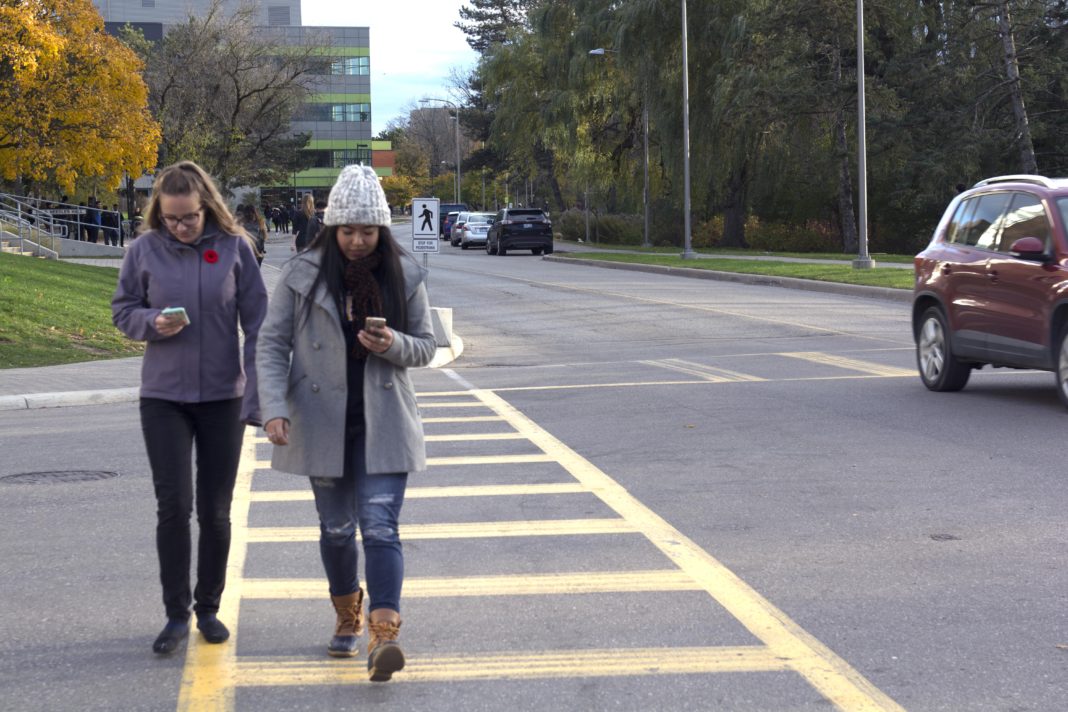If you have ever driven on Ring Road during transition times, you will notice that out of the hundreds of students crossing the street, a large number of them have their heads down and eyes glued to their phone screens.
While they might not necessarily be at risk on Ring Road where drivers are generally very cautious, distracted pedestrians are a growing problem on Ontario’s streets.
Liberal MPP Yvan Baker, the representative of Etobicoke Centre, introduced a new private member’s bill on Monday, Oct. 30 that would prohibit pedestrians from using their devices while crossing the street.
Restrictions of this nature are commonly referred to as “zombie laws” to illustrate the zombie-like behaviour of pedestrians crossing while being fixated on their phones.
The “Phones Down, Heads Up Act” bans pedestrians from looking at their electronic devices when crossing the road and imposes fines of $50 for the first offense, $75 for the second offense, and $125 for the third offense.
This bill would also require the Ministry of Transportation to launch an annual campaign to raise awareness for distracted driving.
The idea of this bill arose because of repeated concerns from Baker’s constituents on pedestrian deaths in the area.
“Toronto is already one of the worst cities in North America when it comes to traffic. Experts tell us that if you are alert, you are less likely to get hurt,” Baker told press in his news conference. “I would like pedestrians to be aware of the risks of crossing the road while distracted by phones and other electronic devices. My bill would strengthen road safety by encouraging pedestrians and drivers to keep each other safe.”
Ontario isn’t the only area with this problem. Accidents related to distracted pedestrians have been on the rise since the introduction of smart phones. A newly passed law in Honolulu, Hawaii is very similar to Baker’s bill with a $35 USD fine on distracted pedestrians.
Despite the demand for action in reducing the amount of distracted pedestrians, the bill has not gone without criticism. NDP MPP Cheri Di Novo thinks the bill has the wrong focus and says, “It sends a signal that victims are to blame and not distracted drivers.”
Baker responds to this with, “This is not about pointing a finger or holding any group responsible. This is about saving lives and raising awareness.”
Others, including Dylan Reid of Walk Toronto, say that it should be up to drivers to pay attention and pedestrians have the right to cross however they want when they have right of way.
He says the bill “distracts people from the things that will actually make a difference — which are better infrastructure and getting drivers to not look at their phones and pay attention.”
Although this bill has the potential to impact the high number of pedestrian deaths, it is very unlikely that it will be passed. Private member’s bills are public bills that are proposed by a member of parliament that is not part of the ministry.
The debate on the “Phones Down, Heads Up Act” is scheduled for March 2018, but since it is a private member’s bill, it is only allotted one hour for discussion. The upcoming provincial election set for June 7, 2018, which gives parliament very little time to make the bill into a law before parliament is dissolved.
Instead of addressing the problem of zombie pedestrians, the ministry is instead focusing on distracted driving.
Minister of Transportation Steven Del Duca proposed changes to the Highway Traffic Act in September that have not included any terms involving distracted pedestrians. They have, however, proposed a $50,000 fine for dustracted drivers who are found responsible for the death of a pedestrian.
The crack-down on distracted drivers by the ministry is not without merit, as 65 per cent of deaths in collisions are caused by distracted driving, according to the Ontario Provincial Police. Another report, from Ontario’s chief coroner, says that in 2010, seven per cent of pedestrian deaths were caused by pedestrians being distracted by their phones.
When asked about the value of the statistic, Baker told Toronto Life, “I understand that people might argue that this is a small part of a large problem, but from my perspective, if this legislation could save even one life a year, that would be more than worth it.”
Even so, Baker admits that there would be difficulty enforcing such a law. He told CBC News that the bill would, “give police another tool to alert pedestrians to the risk of crossing the road while being distracted by their smartphone.”
This does not necessarily mean that the law will even be properly enforced (e.g. jaywalking regulations), and individual municipalities will even be able to opt out of enforcing the law altogether.
Regardless of such, the enactment of such a bill raises awareness of the issue and is meant to deter dangerous habits.
Pedestrians will have to think twice before engaging in such behaviour and spare the five seconds of screen time to pay attention to the road.































